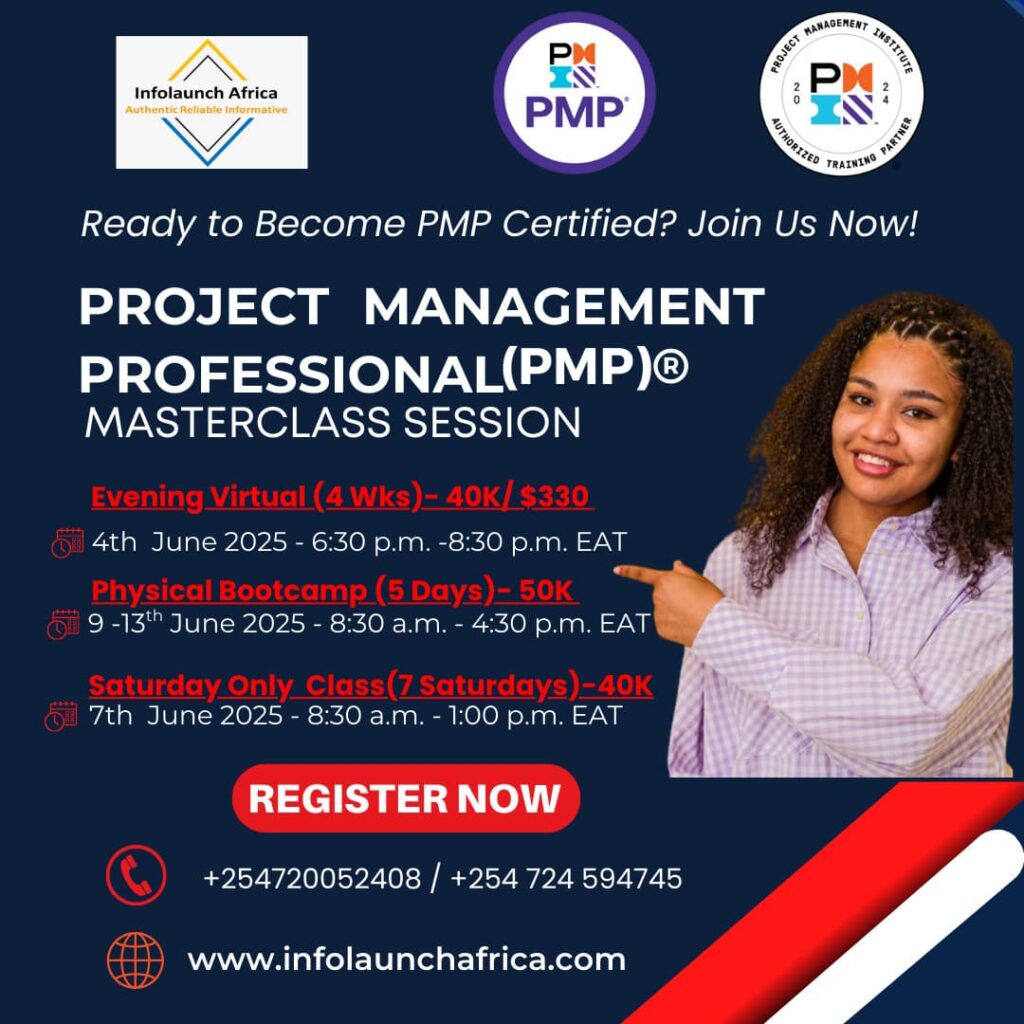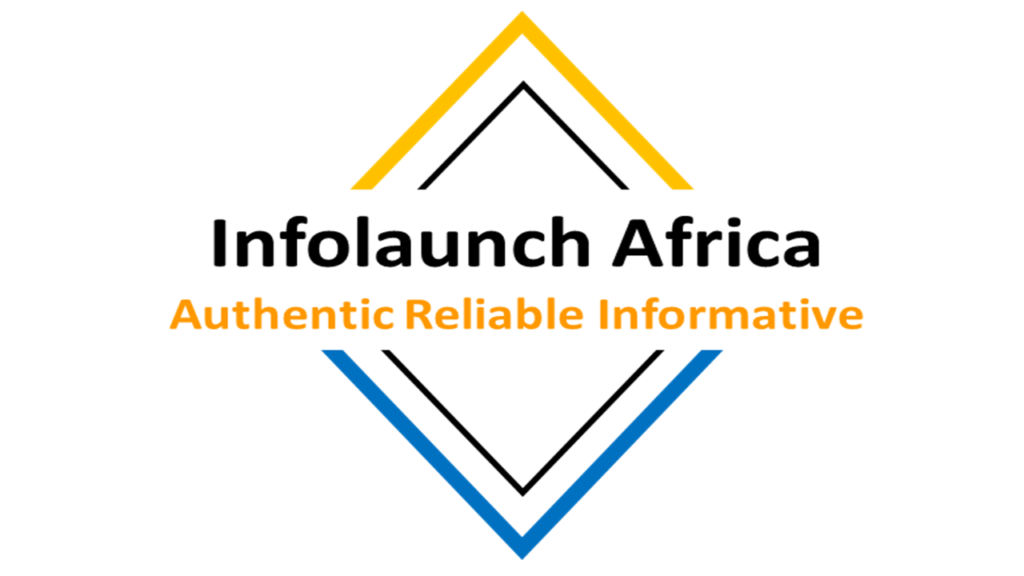- +254 720052408 / +254 724594745
- Info@infolaunchafrica.com
PMP® CERTIFICATION
Register for upcoming classes
At Infoalunch Africa, we successfully trained and mentored thousands of candidates at the individual or corporate level, with thousands of candidates passing the PMP certification exam on their first attempt. In 2023 & 2024 , Infolaunch Africa produced a high number of PMPs, with a few of them included in the video below. The year 2025 is turning out to be a successful year, as we have already produced a substantial number of PMPs by the end of the first quarter.
Are you ready to take your project management career to soaring heights? Do you want to increase your earning potential as a project manager? Look no further!
Transform your career with a PMP® certification, one of the fastest-growing professions in the world. PMP® certification is globally accepted, make you earn a better salary, enhance your career growth, and make you a better project manager.
Enroll in our upcoming Live Project Management Professional (PMP®) master class training program and start your journey towards becoming a certified PMP®. Our flexible training schedule is designed to fit your busy lifestyle. Infolaunch Africa is a PMP® Authorized Training Partner (ATP) with high PMP® exam success rates. We have weekly, weekend, and evening classes, both physical and virtual, to suit your training needs.
Some of the Benefits of PMP Certification Include;
1. High salary
PMP®-certified project managers earn a higher salary than their non-certified counterparts. Remember, PMP® is a global credential that is recognized internationally. According to a survey conducted by Earning Power on Project Management Salary Ninth Edition, PMP® certification holders earn 25% more than non-certified ones.
2. Enhances Your Career Growth and Increases Opportunities
PMP certification opens doors to new career opportunities and advancement. Certified project managers are often preferred candidates for leadership roles, promotions, and higher-paying positions in various industries. Therefore, becoming a PMP®-certified project manager is a strategic move.
3. It Provides International Professional Recognition
The PMP® certification is recognized globally, as it is the most valuable project management certification. This means that you can work in any part of the world, which boosts your marketability. The studies have shown that companies with PMP®-certified project managers complete their projects within budget and time.
4. You Can Use It in Any Field
Project managers can work in any field. Most companies across the world have realized the importance of hiring project managers, and most of them are seeking certified PMP®s to make sure their projects are implemented with excellence. Some of the sectors leading in hiring certified PMP® include, but are not limited to, construction, manufacturing, insurance, banking, oil and gas, information and technology, NGOs, and medicine.
5. It Enhances Your Skills to Handle More Complex Projects
The PMP certification process involves rigorous study and examination of project management principles, processes, and best practices. PMP® certification opens up opportunities to learn new skills, which will sharpen your project management skills. As a result, certified professionals gain a deeper understanding of project management concepts and methodologies, which they can apply to their projects with greater confidence and effectiveness.
6. Provide You with Networking Opportunities
Possessing PMP® certification will help you network with other certified PMP®s across the world. These networks are important as they will help you learn from other professionals; moreover, they may provide an opportunity for getting a better job.
7. It Makes You More Credible Over Non-PMP®
Recently, there has been a growing demand for project managers worldwide, with most employers including PMP® certification as one of the job specifications. This means that if you are PMP® certified, you have a higher chance of getting the job than non-PMP®s. PMP® certification is evidence of your commitment to a project management career, which makes most employers and clients have faith in you.
8. Recognition of Expertise
Achieving PMP certification demonstrates your commitment to excellence and professionalism in project management. It signifies that you have met the rigorous standards set by PMI and have the expertise to lead and manage projects of varying sizes and complexities.
In conclusion, I would highly recommend that you acquire PMP® certification, especially if you consider growing in your career. The course will enhance your project management skills and increase your chances of getting more job opportunities. Also, it will equip you with the necessary skills to work in a variety of industries.
Why you should train PMP certification with us?
Some of Corporates we have trained include















FAQS – Frequently Asked Questions
The PMP certification stands for Project Management Professional. It is a globally recognized credential offered by the Project Management Institute (PMI). To obtain PMP® certification, a project manager must meet certain requirements (that include at least 35 contact hours with an accredited trainer) and pass a 180-question exam.
This certification validates a person's competency in leading and directing project teams and in delivering project results within the constraints of schedule, budget, and resources. PMP® certified professionals are often sought after in various industries for their demonstrated expertise in project management methodologies, techniques, and best practices.
Applicants need to meet EITHER one of these requirements in order to take the PMP® certification exam
Scenario One
- Hold a four (4) year bachelor's degree (any degree)
- Minimum of 3 years of experience in leading and directing projects
- 35 hours of project management education/training.
OR
Scenario Two
- Hold a Secondary Degree (High School Diploma, Associate's Degree, or Global equivalent)
- Minimum of 5 years of Project Management experience in leading and directing projects.
- 35 hours of Project Management Education.
The Project Management Professional (PMP) examination is intended for those who work in the project management industry and are seeking to demonstrate their expertise and understanding in the field. Specifically, individuals who typically pursue the PMP exam include: Project managers, project team members, project coordinators, project stakeholders and anyone interested in Project Management who wish to pursue a career or enhance their skills in project management.
The duration that you take to be PMP certified depends on you. If you are a dedicated candidate with study discipline, then you can take a very short time. Most of our candidates take 2 months, inclusive of the training duration.
The format of the PMP (Project Management Professional) exam is as follows:
Computer-Based Exam: The PMP exam is administered via computer, either at designated testing centers or home-based.
Question Types: The PMP exam is a multiple-choice exam. All questions are situational and do not test memory. The PMP exam also includes drag-and-drop, matching, and other interactive question formats.
Duration: The PMP exam lasts 3 hours, 50 minutes (230 minutes).
Number of Questions: The PMP exam typically contains 180 questions. However, only 175 questions are scored. The five pre-test questions are randomly distributed throughout the exam and are used for statistical purposes to determine their effectiveness for future exams.
The pass score for the Project Management Professional (PMP®) certification exam is not disclosed publicly as the Project Management Institute (PMI) stopped publishing the pass score for the PMP® exam.
PMI uses a complex scoring algorithm based on the difficulty of the questions you answer correctly. It's crucial to remember that PMI regularly modifies the passing score using statistical analysis to guarantee uniformity and fairness across several exam versions.
The pass score of the PMP® exam is determined by the types of questions you get in your PMP® exam. If most of your exam questions are easy, your pass score is likely to be slightly higher. Moreover, if most of your PMP® exam questions are difficult, then your pass score will be slightly lower. However, the pass score is estimated to be between 60 and 70%, according to the expert.
Preparing for the PMP exam requires a structured approach and dedication. Below is a general guide to help you prepare effectively:
- Join our PMP Master Class. During the training, we will cover the exam comprehensively, provide you with structured study plans, and offer practice questions and simulated exams to assess your readiness.
- Understand the Exam Structure: Understand the distribution of questions across the different project management domains outlined in the PMP exam Content Outline (ECO).
- Utilize Additional Study Resources: Such as PMBOK Guide, Ahile Practice Guide, Rita etc
- Create a Study Plan: Develop a study schedule that fits your timeline and commitments.
- Practice with Sample Questions: One of the secret of passing PMP exam is practicing with many questions.
- Focus on Weak Areas: Identify your weak areas through practice exams and quizzes.
The PMP (Project Management Professional) certification is valid for three years. After three years, certified individuals need to renew their certification to maintain their PMP status.
A person must obtain 60 Professional Development Units (PDUs) over the three-year certification cycle in order to renew their PMP certification. PDUs can be obtained by taking part in webinars, training sessions, contributing to the field of project management, and other learning opportunities, among other professional development activities.
The PMP exam fee varies based on a number of criteria, including exam location and whether or not you are a member of PMI. Exam fees are usually discounted for PMI members. The exam fee is $555 for non-PMI- members and $405 for PMI- members.
You can retake the PMP (Project Management Professional) exam if you don't pass it the first time. A candidate is given three attempts every year. The candidate is normally given a one-year break if they fail on the third attempt. However, you will need to pay a fee to retake the exam.
PMI offers discounted retake fees for PMI members, so it is important to check the current fee structure on PMI’s website. Remember that the exam's content may change in the future. Make sure you are conversant with the most recent edition of the PMBOK (Project Management Body of Knowledge) Guide as well as any updates to the exam content outline.
The PMP Examination Content Outline, which lists the domains, tasks, and enablers covered in the exam, is published by PMI. It is recommended that candidates go over this framework and tailor their study sessions accordingly.
There are two ways of taking PMP exam; you can schedule online proctored exam (home-based exam) or center-based exam at any time.
Testing Center: In the past, candidates have only taken the PMP exam at approved testing centers. These centers have the facilities and proctors required to guarantee a safe and regulated testing environment. Candidates schedule their exam date and time directly with the testing center based on availability.
Online Proctored Exam: PMI also offers the option to take the PMP exam remotely via an online proctored format. This enables applicants to take the test in the convenience of their own home or at another location of their choosing. In order to guarantee test integrity, online proctored exams are administered under close supervision utilizing webcam and screen-sharing technology. To take the online exam, candidates need to fulfill certain technical guidelines and follow the tight restrictions that PMI provides.

Call us Today
+254 724 594 745
+254 720 052 408
+254 721 782 738
You’d like to talk to us about a project, or anything else, we’d love to hear from you
